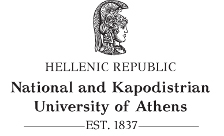Course: MATHEMATICS II
Code: MTH102
Semester: B'
Instructors: group A', Visiting Professor (E. Melas); group B', I. Leventidis
Aim
The aim of this course is to develop basic concepts of linear mathematics and link them to geometric intuition and economic and statistical applications. By means of these linear concepts advanced topics of multivariable functions will be developed, such as unconstrained multivariable optimization and constrained optimization with equality constraints.
Syllabus:
Vectors in 2 and 3 dimensions (Basic concepts, Operations, Internal Product). MATRICES - Definition, Operations, Product, Transposition, Inversion. - Similar Matrices, Matrix Trace. DETERMINANTS - Definition - Properties - Applications - Matrix rank. Systems of Linear Equations - Basic theory - Solution methods. Homogeneous systems. EIGENVALUES - EIGENVECTORS. Basic concepts - Calculations.
Vector equations - Gradient. Jacobi. Isolines. Homogeneous Functions. Euler's theorem. Convexity, Implicit Functions Derivatives, Parametric Functions Derivatives, Tangential Plane. Directional Derivative. Method of least squares. Envelop Theorem. Optimization under constraints - Lagrange. Double Integrals.
Course Textbooks:
Α.Σ. Κορκοτσίδης, Μαθηματικά Οικονομικής Ανάλυσης, Τόμοι Α’, Β’, Γ’. Εκδ. Παπαζήση
Γ. Δονάτος & Μ. Αδάμ, Γραμμικά Μαθηματικά, Gutenberg, 2008.
Στ. Κώτσιος, Ασκήσεις Μαθηματικών για Οικονομολόγους, Τόμος Α. Εκδ. Κριτική.
Bibliography
Chiang, A.C. Fundamental methods of Mathematical Economics, 3rd edition.McGraw Hill,NY 1984. Επίσης, στην Ελληνική.
Rau, N. & M. Pemberton, Mathematics for Economists,ManchesterUniversity Press, 2007.
Simon, C.D. & L. Blume Mathematics for Economists. W.W. Norton and Co., NY 1994.
